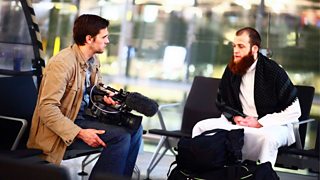The making of My Brother the Terrorist
Film-maker Robb Leech talks about the reasons behind making this highly-personal documentary.

"In June 2013, sat in the public gallery at the Old Bailey, I watched as my stepbrother Richard Dart pleaded guilty to engaging in preparing acts of terrorism. As he uttered those words I tried to make eye contact with him, but he never looked back at me.
Rich was arrested eight months earlier, only weeks after we'd sat and drank coffee together, near his home in Ealing. Back then, we talked of our plans for the future, and of family. For me it was the most relaxed and good natured meeting since he converted. For him it was potentially the last time we would meet.
The decision to make My Brother the Terrorist was not an easy one. Making documentaries about people and their lives is always challenging, but when that person is a member of your family, and their story is a one of terrorism, 鈥榗hallenging' takes on an altogether new meaning.
I had done it before; charted my attempts to reconnect with Richard, shortly after he had converted to an extreme brand of Islam. I wanted to try and understand him, and a strange new world of sharia law and fighting Jihad, that he was now part of.
It turned out to become the toughest thing I had ever done, and although I was immensely proud of the finished documentary, the filmmaking process was emotionally draining, and the tension and conflict it created within my family almost outweighed the virtues of making it.
I didn鈥檛 want to go through all of that again. To be honest I鈥檇 had more than my fair share of beards, burkhas and extremist hate, and confronting the truth about what Rich had been planning to do didn鈥檛 seem like a particularly positive experience for me.
But then something else happened.
Just a few weeks after Rich was sentenced, two other British Islamic extremists did something I will never forget 鈥� they murdered fusilier Lee Rigby, in cold blood, on the streets of Woolwich. It was an act of casual terrorism 鈥� and extreme brutality - that was hard to fathom.
As I watched and listened to one of the killers, Michael Adebolajo, justifying his actions moments after on mobile phone footage, speaking with the same fervent rhetoric I had come to know so well three years before, I knew it wasn鈥檛 something I could ignore. So I began my new journey 鈥� to understand what turns young British men, like my stepbrother, into convicted terrorists.
When you make a film that is so close to home, which impacts those close to you and people you love, self-doubt creeps in. Even up until a few weeks ago I wasn鈥檛 sure I had made the right choice. Is it right to tell this incredibly personal story to the world? What good can it really do? What difference can it really make?
It was around this time that I received an email from a woman whose son had recently been killed in Syria 鈥� he鈥檇 gone out there to fight Jihad. She had since watched My Brother the Islamist, and simply wanted to thank me. The film had shown her she wasn鈥檛 alone, and that maybe it wasn鈥檛 something she had done that caused her son to walk that path. She told me the film had lit a small candle in her heart. I cried when I read those words. Perhaps more than enough reason to make this new film...鈥�
Robb Leech, Director - My Brother the Terrorist
Twitter:
